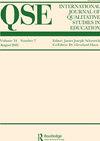K(not) more than threads: tracing the tangled affective lifeworlds of associate professors
IF 1.1
Q3 EDUCATION & EDUCATIONAL RESEARCH
International Journal of Qualitative Studies in Education
Pub Date : 2023-10-09
DOI:10.1080/09518398.2023.2264246
引用次数: 0
Abstract
AbstractAt the heart of the neoliberal university, affective energies linked to roles, responsibilities, expectations, policies, and bodies impact the atmosphere of university life. Associate professors report the highest levels of dissatisfaction among all ranks, as they find themselves entangled in affective knots. To understand these knots in associate professor lifeworlds, we solicit their accounts and reveal affective pain points in the neoliberal university. In this paper, we illuminate the affective knots of melancholy, stasis, and death, giving voice, feeling, and texture to associate professors’ dissatisfaction within the neoliberal institution. However invisible, these affective knots threaten the university’s teaching, learning, scholarship, and social transformation.Keywords: Higher educationneoliberalismaffectassociate professorssocial inequalityacademia Disclosure statementNo potential conflict of interest was reported by the author(s).Notes1 These reflections on cross stitching come from the lived experience of the second author with special care given to the experience of finding knots in your thread while stitching. The reflections are used throughout the piece as a metaphor to make the elusive affective knots that develop in the lived experiences of associate professors more tangible and offer shape to their experiences that often get overlooked.2 For the purposes of this study, we use the terms “associate professors,” “tenured professors” and “mid-career faculty” interchangeably.3 By bodies, what we are talking about in this essay is primarily human bodies. That said there is no need theoretically to limit as such.4 Since conducting our interviews, more has been written about performative listening and nonrepresentational research methods in interviewing (Willink & Shukri, Citation2018). At the time we conducted the interviews, we had yet to theorize these methods or realize the degree to which affect would play such a constitutive role in our findings. As a result, our analysis of our already collected interviews was limited to affective transcription. In future work, we can take fuller advantage of the nonrepresentational methods before and during data collect.5 For example, Berheide and Walzer (Citation2014) and Mullen (Citation2017) found that women are much more likely than men to have served as department chair before being promoted to full professor and are more likely to have experienced delays getting to full professor because of this administrative work.Additional informationNotes on contributorsKate WillinkKate Willink is a Professor of Communication Studies at the University of Denver.Keeley HunterKeeley Hunter is a Communication Faculty at Arapahoe Community College.Hava GordonHava Gordon is a Professor of Sociology at the University of Denver.K(不)更多的线索:追踪副教授们纠结的情感生活世界
摘要在新自由主义大学的核心,与角色、责任、期望、政策和身体相关的情感能量影响着大学生活的氛围。在所有职位中,副教授的不满程度最高,因为他们发现自己陷入了情感的困境。为了理解副教授生活世界中的这些结,我们征求了他们的叙述,并揭示了新自由主义大学中的情感痛点。在本文中,我们阐明了忧郁、停滞和死亡的情感结,为新自由主义机构内副教授的不满提供了声音、感觉和质感。然而,这些无形的情感结威胁着大学的教学、学习、学术和社会转型。关键词:高等教育新自由主义副教授社会不平等学术界披露声明作者未报告潜在的利益冲突。注1这些关于十字绣的思考来自第二作者的亲身经历,他特别注意在缝纫时发现线中的结。在整个作品中,这些反思作为一种隐喻,使副教授们生活经历中发展起来的难以捉摸的情感结更加有形,并为他们经常被忽视的经历提供了形状为了本研究的目的,我们交替使用“副教授”、“终身教授”和“职业中期教师”这三个术语说到肉体,我们在这篇文章中主要讨论的是人的肉体。这就是说,理论上没有必要这样限制自进行我们的采访以来,有更多关于采访中的表演性倾听和非代表性研究方法的文章(Willink & Shukri, Citation2018)。在我们进行访谈的时候,我们还没有将这些方法理论化,也没有意识到影响在我们的研究结果中发挥如此重要作用的程度。因此,我们对已经收集的访谈的分析仅限于情感转录。在未来的工作中,我们可以在数据收集之前和过程中充分利用非表征方法例如,Berheide和Walzer (Citation2014)以及Mullen (Citation2017)发现,女性比男性更有可能在晋升为正教授之前担任系主任,并且更有可能因为行政工作而延迟晋升为正教授。凯特·威林克(kate Willink)是丹佛大学传播学教授。姬莉·亨特(Keeley Hunter)是阿拉帕霍社区学院传播系的一名教师。Hava Gordon是丹佛大学的社会学教授。
本文章由计算机程序翻译,如有差异,请以英文原文为准。
求助全文
约1分钟内获得全文
求助全文
来源期刊

International Journal of Qualitative Studies in Education
EDUCATION & EDUCATIONAL RESEARCH-
CiteScore
2.90
自引率
9.10%
发文量
123
期刊介绍:
The aim of the International Journal of Qualitative Studies in Education (popularly known as QSE) is to enhance the practice and theory of qualitative research in education, with “education” defined in the broadest possible sense, including non-school settings. The journal publishes peer-reviewed empirical research focused on critical issues of racism (including whiteness, white racism, and white supremacy), capitalism and its class structure (including critiques of neoliberalism), gender and gender identity, heterosexism and homophobia, LGBTQI/queer issues, home culture and language biases, immigration xenophobia, domination, and other issues of oppression and exclusion.
 求助内容:
求助内容: 应助结果提醒方式:
应助结果提醒方式:


